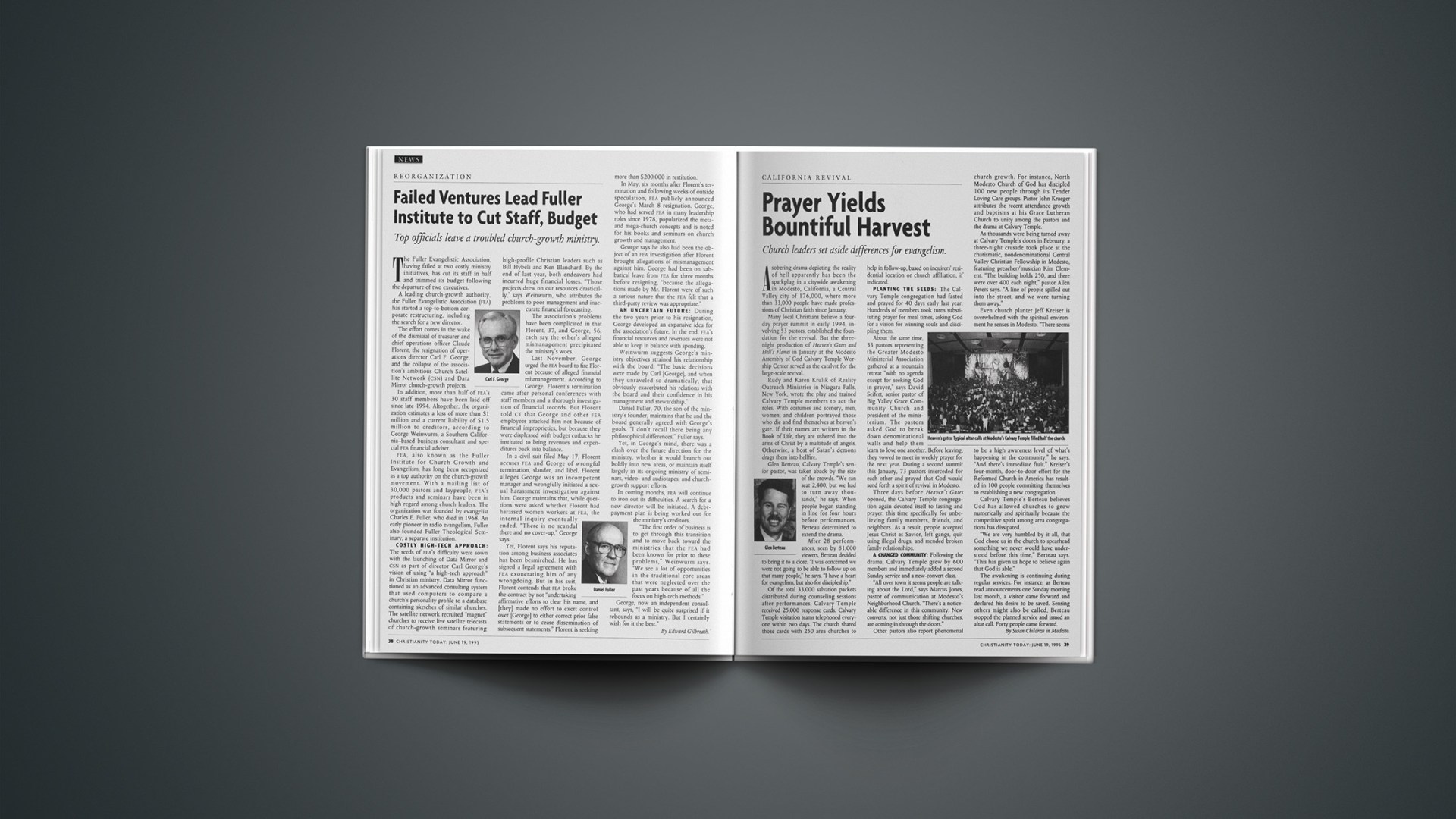The Fuller Evangelistic Association, having failed at two costly ministry initiatives, has cut its staff in half and trimmed its budget following the departure of two executives.
A leading church-growth authority, the Fuller Evangelistic Association (FEA) has started a top-to-bottom corporate restructuring, including the search for a new director.
The effort comes in the wake of the dismissal of treasurer and chief operations officer Claude Florent, the resignation of operations director Carl F. George, and the collapse of the association’s ambitious Church Satellite Network (CSN) and Data Mirror church-growth projects.
In addition, more than half of FEA’s 30 staff members have been laid off since late 1994. Altogether, the organization estimates a loss of more than $1 million and a current liability of $1.5 million to creditors, according to George Weinwurm, a Southern California-based business consultant and special FEA financial adviser.
FEA, also known as the Fuller Institute for Church Growth and Evangelism, has long been recognized as a top authority on the church-growth movement. With a mailing list of 30,000 pastors and laypeople, FEA’s products and seminars have been in high regard among church leaders. The organization was founded by evangelist Charles E. Fuller, who died in 1968. An early pioneer in radio evangelism, Fuller also founded Fuller Theological Seminary, a separate institution.
COSTLY HIGH-TECH APPROACH: The seeds of FEA’s difficulty were sown with the launching of Data Mirror and CSN as part of director Carl George’s vision of using “a high-tech approach” in Christian ministry. Data Mirror functioned as an advanced consulting system that used computers to compare a church’s personality profile to a database containing sketches of similar churches. The satellite network recruited “magnet” churches to receive live satellite telecasts of church-growth seminars featuring high-profile Christian leaders such as Bill Hybels and Ken Blanchard. By the end of last year, both endeavors had incurred huge financial losses. “Those projects drew on our resources drastically,” says Weinwurm, who attributes the problems to poor management and inaccurate financial forecasting.
The association’s problems have been complicated in that Florent, 37, and George, 56, each say the other’s alleged mismanagement precipitated the ministry’s woes.
Last November, George urged the FEA board to fire Florent because of alleged financial mismanagement. According to George, Florent’s termination came after personal conferences with staff members and a thorough investigation of financial records. But Florent told CT that George and other FEA employees attacked him not because of legitimate financial improprieties, but because they were displeased with budget cutbacks he instituted to bring revenues and expenditures back into balance.
In a civil suit filed May 17, Florent accuses FEA and George of wrongful termination, slander, and libel. Florent alleges George was an incompetent manager and wrongfully initiated a sexual harassment investigation against him. George maintains that, while questions were asked whether Florent had harassed women workers at FEA, the internal inquiry eventually ended. “There is no scandal there and no cover-up,” George says.
Yet, Florent says his reputation among business associates has been besmirched. He has signed a legal agreement with FEA exonerating him of any wrongdoing. But in his suit, Florent contends that FEA broke the contract by not “undertaking affirmative efforts to clear his name, and [they] made no effort to exert control over [George] to either correct prior false statements or to cease dissemination of subsequent statements.” Florent is seeking more than $200,000 in restitution.
In May, six months after Florent’s termination and following weeks of outside speculation, FEA publicly announced George’s March 8 resignation. George, who had served FEA in many leadership roles since 1978, popularized the meta- and mega-church concepts and is noted for his books and seminars on church growth and management.
George says he also had been the object of an FEA investigation after Florent brought allegations of mismanagement against him. George had been on sabbatical leave from FEA for three months before resigning, “because the allegations made by Mr. Florent were of such a serious nature that the FEA felt that a third-party review was appropriate.”
AN UNCERTAIN FUTURE: During the two years prior to his resignation, George developed an expansive idea for the association’s future. In the end, FEA’s financial resources and revenues were not able to keep in balance with spending.
Weinwurm suggests George’s ministry objectives strained his relationship with the board. “The basic decisions were made by Carl [George], and when they unraveled so dramatically, that obviously exacerbated his relations with the board and their confidence in his management and stewardship.”
Daniel Fuller, 70, the son of the ministry’s founder, maintains that he and the board generally agreed with George’s goals. “I don’t recall there being any philosophical differences,” Fuller says.
Yet, in George’s mind, there was a clash over the future direction for the ministry, whether it would branch out boldly into new areas, or maintain itself largely in its ongoing ministry of seminars, video- and audiotapes, and church-growth support efforts.
In coming months, FEA will continue to iron out its difficulties. A search for a new director will be initiated. A debt- payment plan is being worked out for the ministry’s creditors.
“The first order of business is to get through this transition and to move back toward the ministries that the FEA had been known for prior to these problems,” Weinwurm says. “We see a lot of opportunities in the traditional core areas that were neglected over the past years because of all the focus on high-tech methods.”
George, now an independent consultant, says, “I will be quite surprised if it rebounds as a ministry. But I certainly wish for it the best.”
Copyright © 1995 Christianity Today. Click for reprint information.
ctjun95mrw5T7038566b










